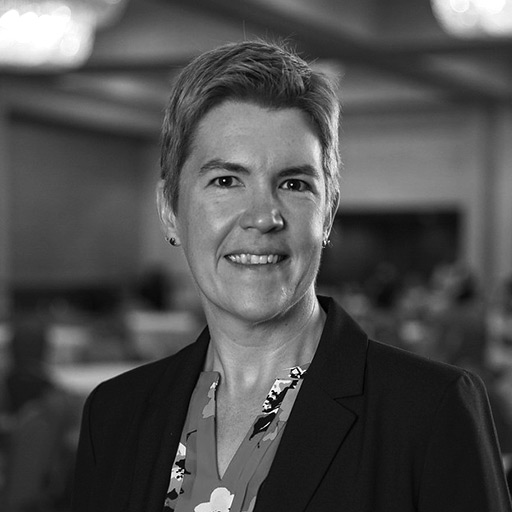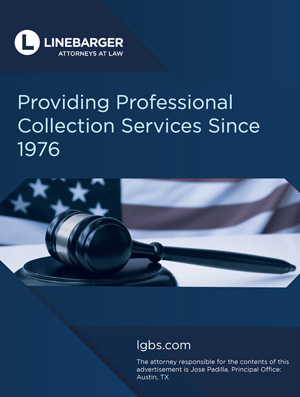Angie VanSchoick
- Court Administrator, Breckenridge Municipal Court, Breckenridge, Colorado
- NACM Board of Directors, elected July 2018
- Number of judges at court: 1
- NACM member since 2013
How did you come to work for the courts?
I came to work for the courts in a very roundabout way. I had been working in health care since 2003, first as a program manager, then a health educator, and, finally, as a clinic manager. The clinic manager position, I found out later, was seasonal, so I was going to be out of a job by April 2013. I had been looking around for other opportunities, mainly in health care, when I came across the court administrator posting. Reading through the job description made me realize that many of the health-care skills I possessed, as well as my educational background, were a great fit. Ultimately, they hired me in March 2013, and I helped out at the clinic for a couple weeks (working a full seven-day week between both jobs) until they could pull someone in to finish up the season. I’ve been here ever since and am really happy that I found this position. It’s a great combination of my skills and experience.
Can you tell us a little about your background?
I graduated with a bachelor of science in sociology and anthropology in 1997 and went straight to work at the University of Michigan for a medical program, then the graduate studies program. I eventually left there and spent a year working for the Toyota Technical Center, which was interesting since they were the ones working on prototype cars for auto shows. I’d see things before they were slated for production (the Matrix being the first one). Eventually, I decided to pursue my master’s in social work. Initially, I had planned on going into therapeutic practice, but realized that I’m one who takes other’s problems home, so that wasn’t going to work well for me. I changed my major to a macro-level focus of policy, evaluation, community social systems, and community organization. I was interested in working at a governmental level to implement policy changes for communities. Obviously, I didn’t end up in that line of work, but really enjoy the opportunity to apply my social-work skills to my court position.
How did you first get involved in NACM?
I became a member of NACM in the fall of 2013. I attended my first annual conference on a scholarship, in 2015, and realized how very helpful the information at the conference would be for my job. By that point, I was more active in my state’s municipal court association, so I knew anything I learned at NACM would help my fellow administrators.
What made you decide to run for the NACM Board?
In my experience, being on the board of something helps you understand better what the association does. When I first started working in the municipal court, I was quite unfamiliar with everything court related. I had never been involved with a court, in any capacity. I find the best way for me to learn is to be fully immersed, so becoming a NACM Board member felt like the best way for me to become more proficient in my role.
What would you say to someone contemplating getting involved in NACM?
Just do it! When I attended my first Governance Committee meeting, I felt like a fish out of water. People were talking about subjects and I had no idea what they were even saying! My court is pretty small (I’m the only full-time employee), so the issues they were facing were somewhat alien to what I deal with on a daily basis. However, there were still many areas that I knew I could contribute my expertise. It’s been my experience that you will always have something to contribute, you just have to get out of your own way to do so.
What do you think are the greatest challenges that smaller courts face?
I think the greatest challenges for smaller courts are staffing and budget. I know many of my colleagues are unable to attend NACM conferences, or become NACM members, due to budget constraints. Additionally, it can be difficult to get approval to attend multiday conferences because the staff resources aren’t there. One of the fortunate things we have in Colorado is a listserv for the municipal courts, so we can ask questions of our peers and get timely responses. There’s always going to be that one situation that seems very random, but someone else has also dealt with it. Another challenge I see as an educator for the court administrators is how to deal with those defendants who have mental health issues. My particular county does not have a wealth of referral opportunities available, as is the case for many of the more rural areas, so it’s difficult to provide proper assistance to those defendants. In this regard, I’m glad for my social-work background, as I’m aware of organizations that assist at a national level, so I can glean information from them to give to both defendants and other administrators.
How has your NACM membership helped you address some of these challenges?
I think the greatest benefit of NACM membership is the exposure to the different levels of courts and the realization that, no matter the size, we all deal with similar challenges. We’re dealing with opioid and mental-health issues just as the federal and state courts are, but with fewer resources at our disposal. By being a NACM member, I can relate the struggles the small courts face and be a voice for their concerns.
What energizes you outside of work?
I have a four-year-old daughter who keeps me on my toes, so I have to stay energized for her. I’m fortunate to live somewhere with miles and miles of hiking and mountain-biking trails, so I’ll get out there as often as I can—weather permitting. When it’s snowy, I’ll still go hiking, cross-country skiing, or snowshoeing, with occasional visits to the ski slopes. I have found that being in nature is my best energizer. Some days, I’ll stop at an overlook off the interstate on my way home, just to stare at the mountains as the sun sets.
What potential innovations in the court environment are you most excited to see come to fruition?
I am excited to see more focus on procedural justice and assisting those with mental-health issues in the courtroom. My judge is very good at making sure defendants understand the charges, the advisement, and any other aspect of the legal proceedings. For courts with larger dockets, this may not be feasible, but is vital. Being able to accommodate our defendants with disabilities is very important to make sure they receive the same sentencing and process as others who do not have a disability. I’m also excited to see more incorporation of online dispute resolution (ODR) and artificial intelligence (AI). I’d guess that 80 percent or more of our docket is filled with out-of-state residents, as most citations are issued to people on vacation in our area. The majority of these do plea-by-mail processes so they do not need to appear in person for their arraignment. Having an online option to proceed through their case would be exceptionally helpful and allow them to be processed in a timelier manner. Our court operates two times per month, so it can take a while for them to receive correspondence from the judge after they have submitted their plea.
ABOUT THE EDITOR

Dawn Palermo is the judicial administrator at Jefferson Parish Juvenile Court, Louisiana.



